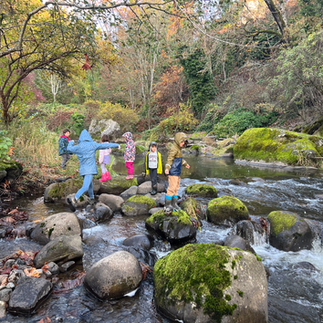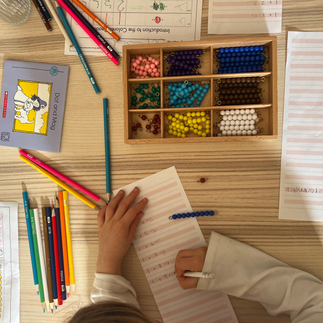Our week got off to a thrilling start when we noticed some fish jumping upstream in the river! Spawning season has begun, and we're here for it! Every morning this week we ventured to the river to witness this wonder of nature - the final migration of these salmon to their birthplace. Check out our Instagram page for videos of this in action (sound on for squeals of excitement!).
It was hard to pull ourselves away, but the cooler mornings are definitely here and each day we returned to the studio with red cheeks and noses and grins ear to ear! The cold may have driven us indoors but our adoration of our fishy friends didn't end right then. We continued to learn about this keystone species and read two books that beautifully tell the tale of their lives: Salmon Creek, by Annette Lebox, and Salmon Forest, by David Suzuki. Through these fictional tales we hear the story of the salmon and how they're intricately intertwined with the river, the forest, and the animals that inhabit both. Something tells me this fascination will continue over the next month or so, as we continue to watch this migration in awe from our cozy little corner on the river they call home.
Halloween is fast approaching and daily conversations are happening in the studio about costumes, best Halloween traditions, favourite candies, and intense debates about sour vs sweet! This week, back by popular demand, the learners partook in a Halloween themed word scavenger hunt! We have a young studio and many of our heroes are still working on their handwriting skills. Cards were scattered about in the studio with words written next to an image. Children had to find each card and then do their best handwriting to match. It was a lot of fun, and sure beats copying lines from a worksheet! Another fun activity for our youngest learners is tracing; getting lots of practice with pencil grip, laying the foundation for tracing numbers, letters, and words. This month has seen a fun rotation of fall and Halloween themed work for them to utilize.
Socratic discussions are a key element of life at Acton Academy and occur at least once every day. In the context of our studios, a Socratic discussion looks something like this: a compelling situation is described (either fictional or based on real historic events) and the participants are made to put themselves in the protagonists shoes. They're then presented with two (often very polarized and equally defensible) options and asked to take a stance, make a choice, and provide reasoning. The guide's role is then to push back on those choices, to play "the devil's advocate", urging the participants to reflect deeply on their reasoning, to examine their thought process and how they arrived at that conclusion. Some say the sign of a perfect Socratic discussion is one in which at the beginning of the discussion the group is equally divided: 50% on one side of the "debate" and 50% on the other. And by the end of the discussion, the group is still divided 50/50, but everyone has switched "sides". So what is the purpose of Socratic discussions in an Acton studio? To foster clear thinking. To develop the ability to think through complex problems, to view a situation from multiple angles, to take a strong stance, to keep an open mind, and to listen whole heartedly to other's view points. In the scenario described above, where the group has fully "flipped", it depicts a group of people who are able to effectively and compellingly present their case, and who are simultaneously able to remain open minded. A group of people who are more interested in being surprised than in being right.
This week we had a very impactful discussion after reading about a true hero, Helen Keller. Children learned of her childhood, the terrible illness that left her deaf and blind at just 19 months old, the years of frustration and isolation, her incredible breakthrough with the word "water" and the trajectory her life took, against all odds. We then were given an "Imagine this" scenario that ended with a choice, of either being blind or deaf. Which would you choose and why? One of the children immediately said, "I'd choose deaf. Then I could still see and I wouldn't bump into things!". I said, "So, M, you'd choose to be deaf? Even if that meant never hearing your mother's beautiful violin playing again?" (she is a concert violinist, true story!). His eyes widened and his jaw literally dropped. "No, no, I would choose blind!". Another learner chimed in, "Yes, I'd choose blind too! Because then I could still hear music and birds!" "So you'd choose bind, V?" I responded. "Even if it meant you'd never be able to see the salmon jumping upstream? To see the leaves changing colour in the fall, or see your dad's big smile again?" Everyone was on the edge of their seat, everyone wanted to voice their opinion, everyone had something to say.....they were all in. It's an impossible choice, and there is of course no right or wrong answer, but the act of putting ourselves in the shoes of someone who lives this reality deepens the learning, ties Helen's story to each of us, and serves as a huge inspiration of the strength of the human spirit. Our call to action at the end of the discussion was this: Helen was blind and deaf and experienced extreme frustration during her journey to being able to read and write, but she never let that stop her from achieving her goals. Today during core skills time, what inspiration will you pull on if you become frustrated, or if you feel you're coming up against a wall?
After this discussion I heard learners saying things like, "If Helen could do that, I can do this!". I have a feeling the impact of her story will stay with us all for years to come. The children were so touched by her journey, they requested to read the story every morning this week. I happily obliged :)
Our older learners are continuing to work hard during Core Skills time (approx. 60 mins each day). They've gotten into the routine of setting and revisiting their SMART goals each day for what they hope to achieve in reading, writing, and math. On Thursday we introduced a new challenge for their journaling - a "word of the day" box. Each morning a new word will be written on a small piece of paper and placed in the box next to the dictionary. If they wish, they can challenge themselves to use that word in their journaling work. If they're unfamiliar with it, they can look it up in our studio dictionary. They were very excited to give this a try! The first word was "contemplate". It was a new word for everyone and they were eager to look it up and use it in their work. Curiosity sparking learning....Acton systems in action :)
I came across this quote from Helen Keller and felt it so perfectly describes everything we believe at Acton Academy. "Character cannot be developed in ease and quiet. Only through experience of trial and suffering can the soul be strengthened, ambition inspired, and success achieved."
The journey of an Acton learner, parent, guide, and owner isn't easy. It pushes us out of our comfort zones. It challenges our thought processes and our old habits. It holds a mirror up to every aspect of our being. It's in the struggle that the magic happens - where the soul is strengthened, ambition inspired, and success achieved.




































Comments